Grizzly Bears Are Becoming Vegetarian Because Of Climate Change

Grizzly bears on Kodiak Island, Alaska, started eating berries instead of salmon because of climate change, according to a new study published in the Proceedings of the National Academy of Sciences of the United States of America.
William Deacy and Jonathan Armstrong, two ecologists from Oregon State University, studied grizzly bears on Kodiak Island for years. Each summer, they observed the bears eating large quantities of sockeye salmon until 2014, when bacteria began eating the salmon and the bears were nowhere to be found. The same occurred in 2015.
In early 2014, the researchers placed tracking collars on 15 bears and used them to discover the whereabouts of the bears in the summer. They found the bears were in the hills, and almost all were near elderberry bushes. Brown bears would usually eat salmon early in the summer and elderberries later in the year — beginning in late August and September — but warmer temperatures caused elderberries to ripen earlier than they usually would. The early ripening caused elderberries and salmon to be available at the same time.
The overlap in the availability of both foods left the bears choosing the berries each time. The researchers were at first baffled because salmon contains twice as much energy as elderberries. The bears would usually eat salmon to gain weight for winter, but were instead choosing a less caloric food.
“An earlier berry crop shut down one of the most iconic predator-prey scenes in nature,” Armstrong said. “As climate change reschedules ecosystems, species that were once separated in time are now getting a chance to interact — in this case the berries, bears and salmon. This is going to have large impacts that are hard to predict.”
If animals overload on protein, they lose weight, according to a 2014 study on macronutrient optimization and energy maximization in brown bears. Elderberries contained less protein than salmon. By focusing on eating elderberries, bears could gain weight as quickly as possible.
“It’s essentially like if breakfast and lunch were served at the same time and then there is nothing to eat until dinner,” Deacy said. “You have to choose between breakfast and lunch because you can only eat so much at a time.”
Red elderberries ripen two and a half days earlier each decade. The new study said if the trend continues, berries will completely overlap with sockeye salmon by 2070.
“It is a strange, indirect effect of climate change. These bears eat dozens of different foods throughout the year, but now two of them are overlapping,” Deacy said. “This is causing disruption in the food web that could have profound implications for the ecology of the island.”
© Copyright IBTimes 2024. All rights reserved.





















